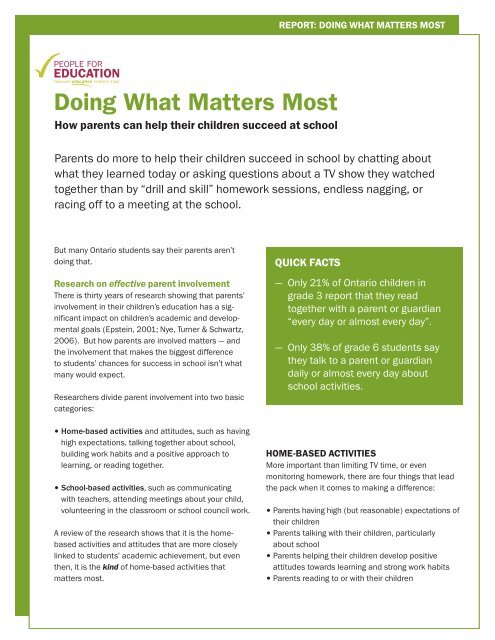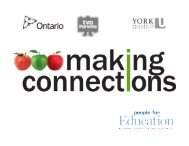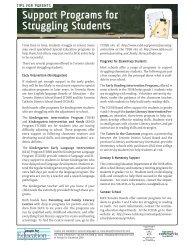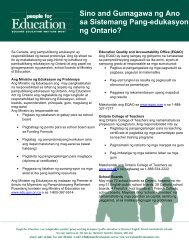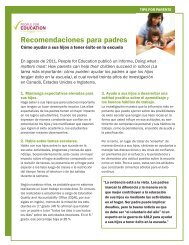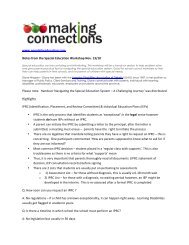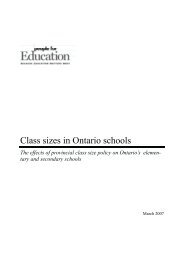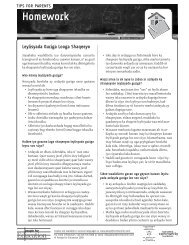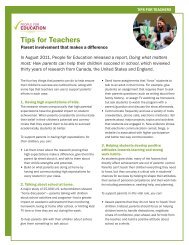Doing What Matters Most - People for Education
Doing What Matters Most - People for Education
Doing What Matters Most - People for Education
Create successful ePaper yourself
Turn your PDF publications into a flip-book with our unique Google optimized e-Paper software.
REPORT: DOING WHAT MATTERS MOST<br />
<strong>Doing</strong> <strong>What</strong> <strong>Matters</strong> <strong>Most</strong><br />
How parents can help their children succeed at school<br />
Parents do more to help their children succeed in school by chatting about<br />
what they learned today or asking questions about a TV show they watched<br />
together than by “drill and skill” homework sessions, endless nagging, or<br />
racing off to a meeting at the school.<br />
But many Ontario students say their parents aren’t<br />
doing that.<br />
Research on effective parent involvement<br />
There is thirty years of research showing that parents’<br />
involvement in their children’s education has a significant<br />
impact on children’s academic and developmental<br />
goals (Epstein, 2001; Nye, Turner & Schwartz,<br />
2006). But how parents are involved matters — and<br />
the involvement that makes the biggest difference<br />
to students’ chances <strong>for</strong> success in school isn’t what<br />
many would expect.<br />
Researchers divide parent involvement into two basic<br />
categories:<br />
QUICK FACTS<br />
— Only 21% of Ontario children in<br />
grade 3 report that they read<br />
together with a parent or guardian<br />
“every day or almost every day”.<br />
— Only 38% of grade 6 students say<br />
they talk to a parent or guardian<br />
daily or almost every day about<br />
school activities.<br />
• Home-based activities and attitudes, such as having<br />
high expectations, talking together about school,<br />
building work habits and a positive approach to<br />
learning, or reading together.<br />
• School-based activities, such as communicating<br />
with teachers, attending meetings about your child,<br />
volunteering in the classroom or school council work.<br />
A review of the research shows that it is the homebased<br />
activities and attitudes that are more closely<br />
linked to students’ academic achievement, but even<br />
then, it is the kind of home-based activities that<br />
matters most.<br />
HOME-BASED ACTIVITIES<br />
More important than limiting TV time, or even<br />
monitoring homework, there are four things that lead<br />
the pack when it comes to making a difference:<br />
• Parents having high (but reasonable) expectations of<br />
their children<br />
• Parents talking with their children, particularly<br />
about school<br />
• Parents helping their children develop positive<br />
attitudes towards learning and strong work habits<br />
• Parents reading to or with their children<br />
<strong>People</strong> <strong>for</strong> <strong>Education</strong> © 2011 page 1
REPORT: DOING WHAT MATTERS MOST<br />
1. High expectations<br />
A series of systematic review articles found high<br />
parental expectations (followed by reading with<br />
children and talking about school) had the greatest<br />
impact on student achievement (Jeynes, 2003,<br />
2005, 2007). When parents consistently communicate<br />
their belief in their children’s potential and<br />
communicate that they expect them to be able to<br />
succeed academically, students do better.<br />
2. Talking about school<br />
A major study of 25,000 U.S. schoolchildren showed<br />
“home discussion”—parents talking with children about<br />
school activities and programs—had a greater impact<br />
on academic achievement than a wide range of other<br />
parent actions. Simply talking with kids about school<br />
was shown to have more of an effect than contact between<br />
parents and the school and parental volunteering.<br />
Talking also had more of an impact than various<br />
<strong>for</strong>ms of parental “supervision,” such as monitoring<br />
kids’ homework, parents being at home after school,<br />
or limiting TV time or the time students were allowed<br />
to go out during the week (Ho & Willms, 1996).<br />
The same study also provides evidence that confronts<br />
stereotypes that some racial groups, or working class<br />
families, place less emphasis on schooling or think<br />
that education is the school’s responsibility (see also<br />
Henderson & Mapp, 2002 <strong>for</strong> similar findings). In fact,<br />
levels of home discussion are relatively consistent<br />
across ethnic-groups, socio-economic status, and<br />
family structure, and between schools.<br />
This finding underscores the importance of education<br />
policy that focuses on supporting home-based discussion.<br />
Policy that focuses on home discussion is more<br />
likely to be useful to all parents, rather than only those<br />
parents who choose to be involved at school. A focus<br />
on school-based involvement may reach only a select<br />
minority of parents because, as Ho and Willms found,<br />
there are substantial class, racial, and family structure<br />
differences in levels of participation on school councils<br />
and parent volunteering at school.<br />
TIPS FOR PARENTS<br />
Help students succeed by talking about school,<br />
having high expectations and building positive<br />
attitudes.<br />
Parent-teacher interviews<br />
Parent-teacher meetings are a vital part of the<br />
bridge between home and school. At the meetings<br />
parents can share in<strong>for</strong>mation about their children<br />
and their goals, learn about their progress, and<br />
teachers can provide concrete strategies to<br />
support students at home.<br />
Report cards<br />
Report cards help parents understand their children’s<br />
progress at school. Read report cards carefully<br />
and focus as much or more on the “learning<br />
skills and work habits” as on the marks. The in<strong>for</strong>mation<br />
about students’ learning skills and work<br />
habits help identify areas where parents can have<br />
an influence. Report cards offer a great opportunity<br />
<strong>for</strong> parents to talk to their children about school.<br />
Concerts, sports events and festivals<br />
Even though concerts, track meets and holiday<br />
festivals may not seem directly related to<br />
academic achievement, parents’ attendance<br />
at them shows children that their parents think<br />
school is important, and importantly <strong>for</strong> students,<br />
demonstrates parents’ engagement in their<br />
children’s education.<br />
In fact, focusing on parents’ participation with their<br />
children at home may begin to help address the<br />
current ‘achievement gap’ between high-, and<br />
<strong>People</strong> <strong>for</strong> <strong>Education</strong> © 2011 page 2
REPORT: DOING WHAT MATTERS MOST<br />
low-per<strong>for</strong>ming students, which is often related to<br />
socio-economic status and race.<br />
The experts agree that schools could be more effective<br />
in their communications with parents about the<br />
importance of their participation with their children’s<br />
education at home. Ho and Willms conclude that<br />
“relatively few schools have strong influences on the<br />
learning climate in the home. We expect that big gains<br />
in achievement could be realized through programs<br />
that give parents concrete in<strong>for</strong>mation about parenting<br />
styles, teaching methods, and school curricula” (1996,<br />
p.138).<br />
But home-based involvement doesn’t necessarily<br />
involve hands-on help with homework. Students’<br />
homework in older grades is related to achievement.<br />
But a major research synthesis on parent involvement<br />
in homework found, in fact, its effect is “negligible to<br />
nonexistent, except among the youngest students”<br />
(Patall, Cooper & Civey, 2008, p.1095).<br />
“... rather than trying to directly<br />
‘teach’ their children, the more<br />
important work of parents can<br />
be found in helping kids handle<br />
distractions, negotiating crises of<br />
confidence, praise <strong>for</strong> ef<strong>for</strong>t and<br />
persistence or constructively<br />
handling conflict while being<br />
positive about school as a whole.<br />
Bit by bit, this ef<strong>for</strong>t builds a solid<br />
foundation <strong>for</strong> success.”<br />
3. Attitudes and work habits<br />
As children grow older, many of the factors that directly<br />
affect achievement are out of parents’ control. Parents<br />
can’t teach their children everything they need to know,<br />
but they can play a critical role in students’ chances<br />
<strong>for</strong> success by helping to shape their attitudes, their<br />
sense of personal competence and their work habits<br />
including persistence, seeking help, and planning<br />
(Hoover-Dempsey & Sandler, 1997; Steinberg,<br />
Lamborn, Dornsbusch & Darling).<br />
This means that rather than trying to directly “teach”<br />
their children, the more important work of parents can<br />
be found in helping kids handle distractions, negotiating<br />
crises of confidence, praise <strong>for</strong> ef<strong>for</strong>t and persistence<br />
or constructively handling conflict while being positive<br />
about school as a whole. Bit by bit, this ef<strong>for</strong>t builds a<br />
solid foundation <strong>for</strong> success.<br />
4. Reading together<br />
Reading is one of the main foundations of all education.<br />
And parents’ can make a major difference by reading<br />
and talking about books and stories with their children.<br />
While the letter-sound correspondence that children<br />
learn at school is vital, the motivation, comprehension<br />
and strong oral language skills children develop<br />
through conversation and reading together with their<br />
parents creates the crucial foundations <strong>for</strong> successful<br />
literacy in primary years and beyond (RAND Reading<br />
Study Group, 2002; Snow, Burns & Griffin, 1998).<br />
Reading and talking in a child’s home language builds<br />
these skills as effectively as reading and talking in the<br />
language of the school (August & Hakuta, 1997).<br />
<strong>People</strong> <strong>for</strong> <strong>Education</strong> © 2011 page 3
REPORT: DOING WHAT MATTERS MOST<br />
THE GAP BETWEEN WHAT THE RESEARCH<br />
SAYS, AND WHAT PARENTS AND SCHOOLS DO<br />
Every year, the province’s <strong>Education</strong>al Quality and<br />
Accountability office surveys all the children in grade<br />
3 and 6 (252,218 students in 2009-10), all their<br />
teachers (15,804), and all their principals (3466) to<br />
provide background in<strong>for</strong>mation on the education<br />
system and individual students (<strong>Education</strong> Quality and<br />
Accountability Office, 2010, pp. 6-16, 22-31).<br />
According to the children, their parents don’t regularly<br />
talk to them about school or read with them.<br />
Talking about school<br />
• Less than half of students in grade 3 (46%) talk to<br />
a parent or guardian “every day or almost every day”<br />
about their school activities.<br />
• 26% of grade 3 students say they never, or only<br />
once or twice a month, talk about school activities<br />
with a parent or guardian.<br />
• 38% of grade 6 students say they talk to a parent<br />
or guardian almost every day about school activities.<br />
• 29% of grade 6 students report that they never,<br />
or only once or twice a month, talk about school<br />
activities with their parents or guardians.<br />
Reading together<br />
• Only 21% of children in grade 3 report that they read<br />
together with a parent or guardian “every day or<br />
almost every day”.<br />
• 55% of grade 3 students report either that they<br />
never read with a parent or guardian, or that they do<br />
so only once or twice a month.<br />
• By grade 6, only 4% report that they read together<br />
every day or almost every day (but 38% of grade 6<br />
students report that they read stories or novels by<br />
themselves, and 47% report they read email, text or<br />
instant messages).<br />
EQAO SURVEY OF 252,218 STUDENTS<br />
IN GRADE 3 AND 6 – 2009–2010<br />
How often do you and a parent, Grade 3 Grade 6<br />
a guardian or another adult who<br />
lives with you do the following?<br />
a. We talk about the activities<br />
I do in school.<br />
Never 9% 9%<br />
1 or 2 times a month 17% 20%<br />
1 to 3 times a week 26% 31%<br />
Every day or almost<br />
every day 46% 38%<br />
No/Ambiguous response 2% 2%<br />
b. We read together.<br />
Never 28% 58%<br />
1 or 2 times a month 27% 25%<br />
1 to 3 times a week 22% 10%<br />
Every day or almost<br />
every day 21% 4%<br />
No/Ambiguous response 2% 3%<br />
<strong>People</strong> <strong>for</strong> <strong>Education</strong> © 2011 page 4
REPORT: DOING WHAT MATTERS MOST<br />
Teachers and principals report<br />
communications gaps<br />
Almost all teachers surveyed communicate with most<br />
parents at least two or three times a year about learning<br />
goals, assessment strategies and how to support<br />
learning at home.<br />
But there are persistently lower levels of communication<br />
in grade 6 than grade 3 – most notably, 59% of grade 3<br />
teachers “share in<strong>for</strong>mation about what to do at home<br />
to support learning with the majority of parents / guardians”<br />
at least once a month, and only 36% of grade 6<br />
teachers shared this in<strong>for</strong>mation. On average, 57% of<br />
Grade 3 and 6 teachers shared in<strong>for</strong>mation about individual<br />
children’s progress at least once a month.<br />
<strong>Most</strong> elementary school principals report that parents<br />
are supportive of their children’s teachers (89%), and<br />
that the school has collaborative relationships with<br />
parents to help meet learning goals (72%).<br />
But the devil is in the details.<br />
While 86% say they keep all parents in<strong>for</strong>med about<br />
school activities, only 32% say they feel successful<br />
helping all parents understand student learning goals<br />
and outcomes.<br />
The results suggest a continued emphasis on schoolbased<br />
parent involvement—getting people into the<br />
school and participating in activities—which research<br />
shows is less closely linked to achievement. This<br />
emphasis is particularly problematic in light of the<br />
evidence that school-based parent involvement (volunteering,<br />
going to council meetings) is most relevant<br />
to white, upper-middle class two parent families (Ho &<br />
Willms, see above). Ontario research confirms school<br />
councils are not generally representative of the parent<br />
community (Parker & Leithwood, 2000; Corter,<br />
Harris & Pelletier).<br />
EQAO SURVEY OF 15,804 TEACHERS<br />
IN GRADE 3 AND 6 – 2009–2010<br />
How often did you share the<br />
following with the majority of Grade 3 Grade 6<br />
the parents and guardians of<br />
your students this year?<br />
a. Learning goals <strong>for</strong> the class<br />
Never 3% 5%<br />
Once 8% 13%<br />
2-3 times 31% 42%<br />
About once a month 47% 30%<br />
About once every<br />
2 weeks 4% 4%<br />
At least once a week 4% 3%<br />
No response/<br />
Ambiguous response 2% 2%<br />
b. Suggestions <strong>for</strong> what to do<br />
at home to support learning<br />
Never 1% 2%<br />
Once 2% 7%<br />
2-3 times 34% 51%<br />
About once a month 42% 29%<br />
About once every<br />
2 weeks 9% 5%<br />
At least once a week 9% 4%<br />
No response/<br />
Ambiguous response 2% 2%<br />
<strong>People</strong> <strong>for</strong> <strong>Education</strong> © 2011 page 5
REPORT: DOING WHAT MATTERS MOST<br />
School councils offer important opportunities <strong>for</strong><br />
community-building, decision-making, communication<br />
and building social networks and a stronger constituency<br />
<strong>for</strong> public education (see e.g. Epstein, 1995).<br />
But an over-emphasis on school-based involvement<br />
may also increase stress on very busy parents—which<br />
isn’t good <strong>for</strong> anyone (see e.g. Lerner et al., 2002;<br />
Corter & Pelletier, 2005).<br />
Careful policy work is required to make help homebased<br />
parent participation in education visible and<br />
make it “count” <strong>for</strong> teachers and principals (e.g.,<br />
Flessa, 2008).<br />
WHAT CAN SCHOOLS DO?<br />
The good news is that school practices can make a<br />
difference, but it’s less about programs and more<br />
about communication, collaboration and building<br />
relationships (Mattingly et al., 2002).<br />
There is a strong body of research finding that there<br />
are some core elements that create effective working<br />
relationships with parents. And those relationships do<br />
have a positive impact on students.<br />
Collaborative relationships and trust<br />
Collaborative relationships with teachers and others at<br />
the school are linked to improved attendance, better<br />
student engagement, more positive relationships<br />
(Harris & Goodall, 2007).<br />
EQAO SURVEY OF 3,466 ELEMENTARY<br />
SCHOOL PRINCIPALS – 2009–2010<br />
How successful was your school in<br />
accomplishing the following this year?<br />
a. Helping all parents and guardians<br />
understand student learning goals<br />
and outcomes<br />
We struggled with this 12%<br />
Somewhat successful 56%<br />
Successful 29%<br />
Very Successful 3%<br />
No response/<br />
Ambiguous response 1%<br />
b. Keeping all parents and guardians<br />
in<strong>for</strong>med about school activities<br />
We struggled with this 1%<br />
Somewhat successful 14%<br />
Successful 51%<br />
Very Successful 33%<br />
No response/<br />
Ambiguous response 1%<br />
Achievement improves, when communication builds<br />
trust between teachers, students and parents (Bryk<br />
& Schneider, 2002). Trust and communication make<br />
it easier <strong>for</strong> kids to move between home and school<br />
with a positive attitude about both, which supports<br />
resilience and achievement (Pianta & Walsh, 1996).<br />
But <strong>for</strong> those collaborative relationships to be<br />
established effectively and be relevant <strong>for</strong> all parents,<br />
schools should take the lead.<br />
<strong>People</strong> <strong>for</strong> <strong>Education</strong> © 2011 page 6
REPORT: DOING WHAT MATTERS MOST<br />
Invitations<br />
One of the factors that affect parents’ decisions to participate<br />
more in their children’s schooling is within control<br />
of the school. Parents need to be invited—both in<br />
general and specific ways. Those invitations can come<br />
directly from the teachers or the school, or indirectly<br />
through the students. A general invitation comes by<br />
creating an inviting school climate, and through teachers’<br />
welcoming, facilitative attitude. Specific invitations<br />
include communications from teachers that suggest<br />
parents get involved in particular activities with<br />
their children.<br />
When teachers suggest a specific activity <strong>for</strong> parents<br />
to do with their children at home, [see box] levels<br />
of parent involvement increase (see e.g., Hoover-<br />
Dempsey & Sandler, 1997; Anderson & Minke,<br />
2007; Epstein, 1991; Reed, Joens, Walker & Hoover-<br />
Dempsey, 2000). Invitations from teachers are particularly<br />
important <strong>for</strong> parents who are less confident in<br />
their ability to help their children in the school system,<br />
and <strong>for</strong> older children where parents may not realize<br />
they have a role to play.<br />
TEACHER INVITATIONS<br />
Parent involvement guru Joyce Epstein suggested<br />
a number of techniques <strong>for</strong> involving parents<br />
in “learning through discussion” at home:<br />
• Ask parents to get their child to talk about<br />
what he or she did that day in the classroom<br />
(sending home suggested questions can<br />
really help!)<br />
• Give an assignment that requires the children<br />
to ask their parents questions, <strong>for</strong> example,<br />
ask children to write about their parents’<br />
experience<br />
• Ask parents to watch a television program with<br />
their child and to discuss the show afterwards.<br />
• Invite parents to come observe the classroom<br />
<strong>for</strong> part of the day, and make time to explain<br />
what you are doing and why.<br />
Two-way communication<br />
Direct communication, seeking in<strong>for</strong>mation from<br />
parents about what they want and need <strong>for</strong> their child’s<br />
success, helps build strong school-family connections.<br />
A shared understanding about what the child will learn<br />
this year and how their learning will be assessed helps<br />
parents support their children and helps maintain communication<br />
all year (Patel, Corter & Pelletier, 2008).<br />
Effective outreach makes a difference in school-wide<br />
achievement. Schools that actively tackle challenges<br />
such as communicating with parents who cannot make<br />
it into the school, or who speak different languages,<br />
have better overall achievement (Sheldon, 2003).<br />
It means educators—particularly teachers—on the<br />
front line, need to look <strong>for</strong> a menu of different ways of<br />
communicating with and hearing from parents (Mapp<br />
& Hong, 2010). Regular email updates or a blog may<br />
work tremendously well <strong>for</strong> many working parents<br />
(at least 77% of Ontario households have internet at<br />
home); but phone calls or face-to-face contact with an<br />
interpreter may also be a better way reach others.<br />
“...educators—particularly<br />
teachers—on the front line,<br />
need to look <strong>for</strong> a menu of<br />
different ways of communicating<br />
with and hearing from parents .”<br />
— Mapp & Hong, 2010<br />
<strong>People</strong> <strong>for</strong> <strong>Education</strong> © 2011 page 7
REPORT: DOING WHAT MATTERS MOST<br />
CONCLUSION<br />
The research on effective parent involvement emphasizes<br />
the importance of parents’ attitudes, and their<br />
activities in the home to support children’s success<br />
in school.<br />
Parents influence their children’s success through high<br />
expectations, talking to their children about school,<br />
and generally working to create a positive attitude<br />
about learning and strong work habits. These things,<br />
along with enjoyable activities such as reading together,<br />
and even watching television together and talking<br />
about what they’ve seen, have more of an impact on<br />
students’ chances <strong>for</strong> success than the more “schoollike”<br />
activities that parents often feel they should<br />
undertake, such as helping with homework.<br />
Ontario research suggests that this message is not<br />
well-known to parents: large numbers of children report<br />
they don’t talk to their parents about school, nor do<br />
they read with their parents. Teachers’ and principals’<br />
self-reports about communication with parents suggest<br />
that home-school communication with most parents<br />
is fairly infrequent, and often focused on activities<br />
at the school rather than on communicating what<br />
parents could be doing at home.<br />
“While there is no quick fix or<br />
program that will ensure effective<br />
parent involvement that boosts<br />
the success of all children, more<br />
could be done to communicate<br />
with parents how they can support<br />
their children’s education. Policy<br />
that includes outreach to all parents<br />
about what they do at home<br />
may reach beyond those parents<br />
who are involved at the school.”<br />
While there is no quick fix or program that will ensure<br />
effective parent involvement that boosts the success<br />
of all children, more could be done to communicate<br />
with parents how they can support their children’s<br />
education. Policy that includes outreach to all parents<br />
about what they do at home may reach beyond those<br />
parents who are involved at the school. This <strong>for</strong>m of<br />
outreach may help to at least partially address the<br />
current achievement gap between high-and lowper<strong>for</strong>ming<br />
students.<br />
<strong>People</strong> <strong>for</strong> <strong>Education</strong> © 2011 page 8
REPORT: DOING WHAT MATTERS MOST<br />
Notes<br />
Anderson, K. J., & Minke, K. M. (2007). Parent involvement<br />
in education: Toward an understanding of parents’ decision-making.<br />
Journal of <strong>Education</strong>al Research, 100(5), 313-323.<br />
August, D., & Hakuta, K. (Eds.). (1997). Improving schooling <strong>for</strong><br />
language-minority children: A research agenda (Vol. National<br />
Research Council of the Academy of Medicine Committee on<br />
Developing a Research Agenda on the <strong>Education</strong> of Limited-English-Proficient<br />
and Bilingual Students). Washington, D.C.: National<br />
Academy Press.<br />
Bryk, A., & Schneider, B. (2002). Trust in Schools: A core resource <strong>for</strong><br />
improvement. New York: Russell Sage.<br />
Corter, C., & Pelletier, J. (2005). Parent and Community Involvement<br />
in Schools: Policy Panacea or Pandemic. In N. Bascia, A. Cumming,<br />
K. Leithwood & D. Livingston (Eds.), International Handbook of<br />
<strong>Education</strong>al Policy (pp. 295-327). New York: Springer.<br />
Corter, C., Harris, P. & Pelletier, J. (1998). Parent participation in<br />
elementary schools: The role of school councils in development<br />
and diversity. Toronto: Ontario Institute <strong>for</strong> Studies in <strong>Education</strong>.<br />
<strong>Education</strong> Quality and Accountability Office. (2010). Ontario student<br />
achievement: EQAO’s provincial elementary school report on the<br />
results of the 2009–2010 assessments of reading, writing and<br />
mathematics, primary division (grades 1-3) and junior division<br />
(grades 4-6). Toronto: Government of Ontario.<br />
Epstein, J. (2001). School and Family Partnerships: Preparing<br />
Educators and Improving Schools. Boulder, CO: Westview.<br />
Epstein, J. L. (1991). Effects on student achievement of teachers’<br />
practices of parental involvement. Advances in reading/language<br />
research, 10, 261-276.<br />
Epstein, J. L. (1995). School/Family/Community Partnerships: Caring<br />
<strong>for</strong> the children we share. Phi Delta Kappan, 76, 701-712.<br />
Flessa, J. (2008). Parent involvement: <strong>What</strong> counts, who counts it,<br />
and does it help? <strong>Education</strong> Today, 48 (2), 19-21.<br />
Harris, A., & Goodall, J. (2007). Engaging parents in raising<br />
achievement: Do parents know they matter? London: Department<br />
of Children, Schools and Families.<br />
Henderson, A., & Mapp, K. L. (2002). A new wave of evidence: The<br />
impact of school, family and community connections on student<br />
achievement.<br />
Ho, S.-C. E., & Willms, J. D. (1996). Effects of parental involvement on<br />
eighth-grade achievement. Sociology of <strong>Education</strong>, 69(2), 126-141.<br />
Hoover-Dempsey, K. V., & Sandler, H. M. (1997). Why do parents<br />
become involved in their children’s education? Review of <strong>Education</strong>al<br />
Research, 67(1), 3-42.<br />
Jeynes, W. H. (2003). A meta-analysis: The effects of parental<br />
involvement on minority children’s academic achievement.<br />
<strong>Education</strong> and Urban Society, 35, 202-218.<br />
Jeynes, W. H. (2005). A meta-analysis of the relation of parental<br />
involvement to urban elementary school children’s academic<br />
achievement. Urban education, 40, 237-269.<br />
Jeynes, W. H. (2007). The relationship between parental involvement<br />
and urban secondary school academic achievement: A metaanalysis.<br />
Urban <strong>Education</strong>, 42, 82-110.<br />
Lerner, R. M., Rothman, F., Boulos, S., & Castellino, D. R. (2002).<br />
Developmental systems perspective on parenting. In M. H.<br />
Bornstein (Ed.), Handbook of Parenting (Vol. 2: Biology and<br />
ecology of parenting, pp. 407-437). Englewood, N.J.: Erlbaum.<br />
Mapp, K. L., & Hong, S. (2010). Debunking the myth of the hard to<br />
reach parent. In S. L. Christenson & A. L. Reschly (Eds.), Handbook<br />
of School-Family Partnerships. New York: Routledge.<br />
Mattingly, D. J., Prislin, R., McKenzie, T. L., Rodriguez, J. L., & Kayzar, B.<br />
(2002). Evaluating evaluations: The case of parent involvement<br />
programs. Review of <strong>Education</strong>al Research, 72, 549-577.<br />
Nye, C., Turner, H., & Schwartz, J. (2006). Approaches to parent<br />
involvement <strong>for</strong> improving the academic per<strong>for</strong>mance of elementary<br />
school age children. Oslo: Campbell Collaboration.<br />
Parker, K., & Leithwood, K. (2000). School councils’ influence on<br />
school and classroom practice. Peabody Journal of <strong>Education</strong>,<br />
75(4), 37-65.<br />
Patall, E. A., Cooper, H., & Civey, R. J. (2008). Parent involvement in<br />
homework: A research synthesis. Review of <strong>Education</strong>al Research,<br />
78(4), 1039-1101.<br />
Patel, S., Corter, C., & Pelletier, J. (2008). <strong>What</strong> do families want?<br />
Understanding their goals <strong>for</strong> early childhood services. In M. M.<br />
Cornish (Ed.), Promising practices <strong>for</strong> partnering with families in<br />
the early years (pp. 103-135). Greenwich, CT: In<strong>for</strong>mation<br />
Age Publishing.<br />
Pianta, R. C., & Walsh, D. J. (1996). High-risk children in schools:<br />
Constructing sustaining relationships. London: Routledge.<br />
RAND Reading Study Group. (2002). Reading <strong>for</strong> Understanding:<br />
Toward and R&D Program in Reading Comprehension. Santa<br />
Monica CA: RAND.<br />
Reed, R. P., Joens, K. P., Walker, J. M., & Hoover-Dempsey, K. V.<br />
(2000). Parents motivations <strong>for</strong> involvement in children’s education:<br />
Testing a theoretical model. Paper presented at the American<br />
<strong>Education</strong>al Research Association, New Orleans.<br />
Sheldon, S. B. (2003). Linking school-family-community partnerships<br />
in urban elementary schools to student achievement on state<br />
tests. The Urban Review, 35(2), 149-165.<br />
Snow, C. E., Burns, S., & Griffin, P. (Eds.). (1998). Preventing reading<br />
difficulties in young children. Washington, D.C.: National Academies<br />
Press.<br />
Steinberg, L., Lamborn, S. D., Dornbusch, S. M., & Darling, N. (1992).<br />
Impact of parenting practices on adolescent achievement: Authoritative<br />
parenting, school involvement, and encouragement to<br />
succeed. Child Development.<br />
<strong>People</strong> <strong>for</strong> <strong>Education</strong> is your strong voice <strong>for</strong> public education.<br />
We conduct vital research, answer parents’ questions, make policy<br />
recommendations and ensure there is broad coverage of education<br />
issues in the media. Together we make Ontario’s schools great!<br />
<strong>People</strong> <strong>for</strong> <strong>Education</strong><br />
641 Bloor Street West, Toronto, ON<br />
M6G 1L1 Tel. 416-534-0100<br />
www.people<strong>for</strong>education.ca<br />
<strong>People</strong> <strong>for</strong> <strong>Education</strong> © 2011 page 9


